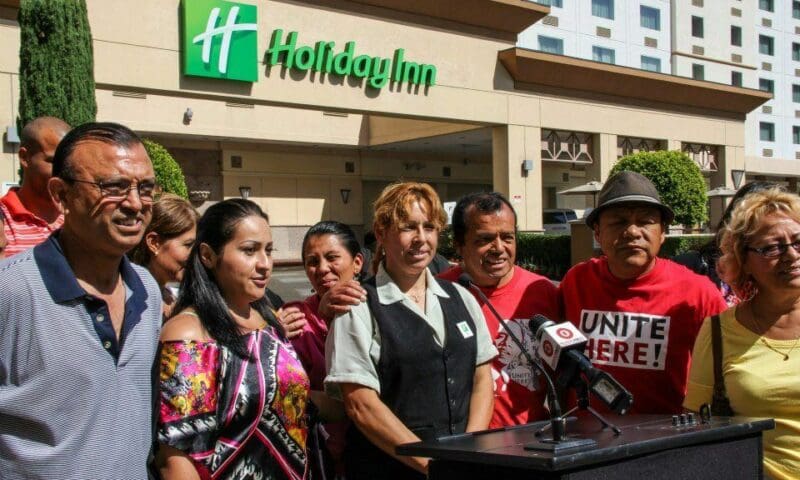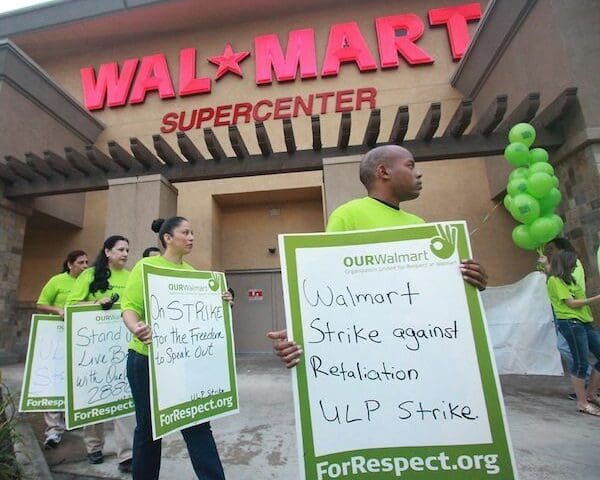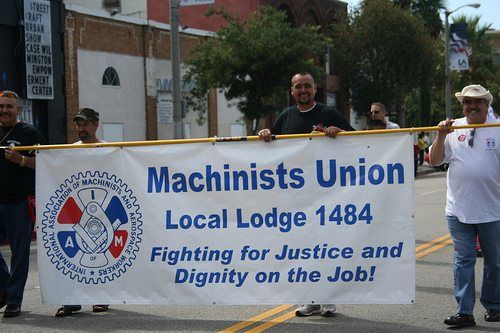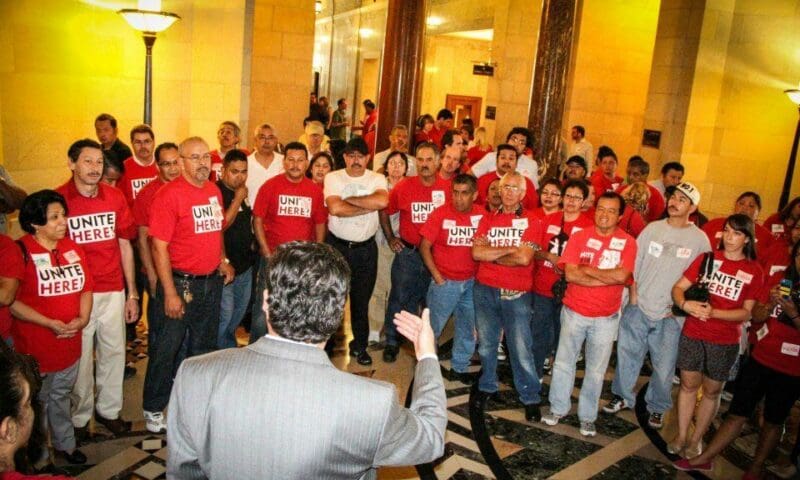

Workers at hotels near LAX on Century Boulevard are supposed to be covered under a 2008 Living Wage Ordinance providing wages of at least $11.97 an hour. A new class action lawsuit alleges that the Holiday Inn LAX willfully violated a host of wage and hour laws — and workers have revealed that conditions at the hotel are unsafe for guests.
UNITE HERE Local 11, who are supporting bartenders, housekeepers, cooks and other Holiday Inn LAX employees, issued a press release on the new class-action lawsuit, that seeks damages for, “back wages, not respecting [employees’] right to take meal breaks, not reimbursing them for expenses incurred while performing their work, and failure to pay them the mandatory ‘Living Wage’ required for all LAX-area hotels.”
Workers allege that they worked over eight hours a day without being paid overtime, their time sheets were tampered with,
» Read more about: LAX Holiday Inn Workers Allege Living Wage Violations »


 “Money is the mother’s milk of politics,” Gloria Romero tells me on the phone. “It’s flowing to both sides. Government isn’t about drawing lines. It’s not about saying you’re on that side and you can’t come over.”
“Money is the mother’s milk of politics,” Gloria Romero tells me on the phone. “It’s flowing to both sides. Government isn’t about drawing lines. It’s not about saying you’re on that side and you can’t come over.”
Her voice is friendly, somewhat placid, but it’s clear Romero is not thrilled with having to answer questions about her political alliance with the Koch brothers and other wealthy supporters of Proposition 32, and she conspicuously avoids bringing up their names. When pressed about the Kochs and the money behind behind Prop. 32, she falls back upon her experience in Sacramento.
“I have sat in the belly of the beast,” she says. “I have seen the realities of money and its influence.”
With Election Day still one month away, the battle to pass Prop. 32 has seen its share of political shockers, including the sudden injection of $4 million of Koch brother money to the Yes on 32 campaign,
» Read more about: How Gloria Romero Became the Face of Proposition 32 »


 The Pasadena/Foothills Chapter of American Civil Liberties Union of Southern California ACLU-SC honored longtime Los Angeles Times journalist, editor and commentator Tim Rutten at its 12th Annual Garden Party on October 2 at the Western Justice Center in Pasadena. Rutten, who had been let go this past summer after nearly 40 years at the Times, spoke to the more than 100 attendees of the threat to civil liberties by the demise of the press in the country and concentration into fewer and fewer corporate hands. He talked about a wide range of topics concerning knowledge, ignorance, and the consequences of media conglomeration.
The Pasadena/Foothills Chapter of American Civil Liberties Union of Southern California ACLU-SC honored longtime Los Angeles Times journalist, editor and commentator Tim Rutten at its 12th Annual Garden Party on October 2 at the Western Justice Center in Pasadena. Rutten, who had been let go this past summer after nearly 40 years at the Times, spoke to the more than 100 attendees of the threat to civil liberties by the demise of the press in the country and concentration into fewer and fewer corporate hands. He talked about a wide range of topics concerning knowledge, ignorance, and the consequences of media conglomeration.
“The coming concentration of the media is probably a bigger threat to your civil liberties than anything the government’s doing right now,” he said.
“Knowledge isn’t just power, it’s self-protection. Most of the newspapers in this country today are hollow shells of what they were 10 years ago and sadly diminished from what they were five years ago,” Rutten continued.
» Read more about: Tim Rutten: Corporate Media Concentration a Big Threat »


“Good morning, everyone. My name is Venanzi Luna and I’m on strike.” With those words, today’s rally at the Pico Rivera Walmart made history as the first ever strike of Walmart workers in the United States.
More than 300 people descended on the store to support the nearly 75 workers who walked off the job today to protest retaliation by the corporate giant. Associates from other stores across Los Angeles, including Duarte, Panorama City and Orange County also joined in the walkout and attended the landmark event. Associates who are members of the group Our Walmart were recently fired for speaking about the cutting of hours, reductions in health benefits and poverty jobs that force many to seek out public assistance programs to stay afloat.
Workers, joined by their spouses and children, cheered and nodded in agreement as fellow store associates talked about what they hoped to achieve by standing up.
» Read more about: Pico Rivera Rally Supports Walmart Strikers »


We survived Carmageddon II last weekend, so pat yourself on the back now for having made it! Or as I’ve heard others call Carmageddon, the “Rampture.” The I-405 Freeway, from the I-10 to Highway 101, was closed for the second time in 14 months for the Sepulveda Pass Improvements Project, which will add desperately needed carpool lanes to the 405 Freeway. (Though what we really need is better public transit, but I digress)
Metro and elected officials warned us for months—“It’s coming!”
They pleaded with the public—leave your cars at home, stay away from the area, shop, play, and dine locally. As an L.A. native, I’ve had my fair share of moments of being stuck in dreadful traffic, so when they asked that I leave my car at home, I sure did—both last year and this past weekend. And almost every day of the year—for my own sanity and because our city can use one less car on the road.
» Read more about: Carmageddon II : Did You Breathe Better Last Weekend? »


This legislative session brought some exciting victories as well as some deep disappointments. Labor accomplished big things this year that benefit all Californians but when it came to advancing worker protections, many of those bills were vetoed.
Successes:
» Read more about: State Labor Legislation, 2012: Wins and Losses »


 In Los Angeles, the reins of power lie in the hands of a very few. By “power” I mean “electricity,” and there are only a few men and women whose job it is to procure and dispense it. Last week I wrote about the “Magic City,” and all the unseen infrastructure and work that goes into delivering the power and water that we city dwellers usually take for granted. There may be no better example of this unseen work than a certain unremarkable-looking Los Angeles Department of Water and Power building. Inside is a two-story main control room lined with a schematic map of the power system, a 180-degree wrap-around diagram that lights up where there are trouble spots and gives workers a robotic bird’s-eye view of L.A.
In Los Angeles, the reins of power lie in the hands of a very few. By “power” I mean “electricity,” and there are only a few men and women whose job it is to procure and dispense it. Last week I wrote about the “Magic City,” and all the unseen infrastructure and work that goes into delivering the power and water that we city dwellers usually take for granted. There may be no better example of this unseen work than a certain unremarkable-looking Los Angeles Department of Water and Power building. Inside is a two-story main control room lined with a schematic map of the power system, a 180-degree wrap-around diagram that lights up where there are trouble spots and gives workers a robotic bird’s-eye view of L.A.
It is from this nondescript building that the LADWP brings in electricity from all over the American West,
» Read more about: The High Cost of Hot Days: LADWP and Peak Demand »


A couple of weeks ago I sat in on a meeting of the leadership of some local hotels. These were not the hotel managers, but the leaders among the workers who clean the rooms, clear the tables, chop the vegetables in the kitchen, vacuum the rugs in the lobby and perform all the other back-breaking tasks that make a hotel comfortable for guests.These people – all from hotels with union contracts – face tough negotiations going into the fall and their workplaces could face serious competition from several proposed downtown hotel projects.
Nearly all these men and women, many of whom arrived wearing the uniforms of their hotels, spoke Spanish. This put me at a serious disadvantage because despite my efforts to learn this beautiful language, I can’t seem to speak it and I can hardly understand the rapid sentences thrown back and forth between people who all know one another and have worked together for years.
» Read more about: Found in Translation: A Union Contract's Strengths »